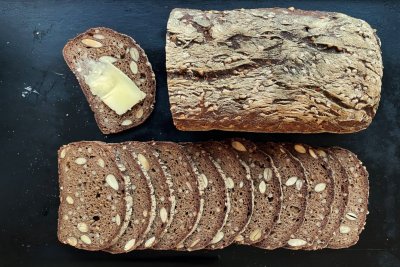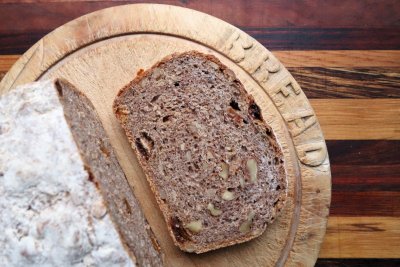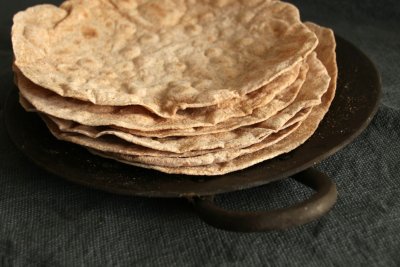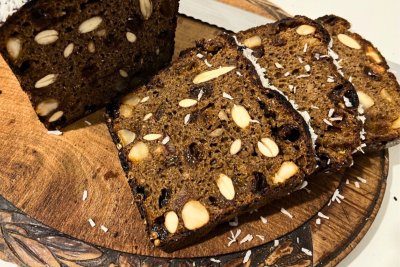Sustain / Real Bread Campaign / Recipes
Danish style g-free bread
Dark and hearty.

Naomi Devlin’s recipe is inspired by rugbrød, Danish dark rye bread, traditionally made over the course of three days, and often full of seeds or nuts.
Naomi says: ‘The poolish produces a dark, complex flavoured, hearty bread. If you choose a dark buckwheat flour the bread will be even heartier. Miso, cocoa and brown teff bring malty and umami flavours and it slices as thinly as good rugbrød should. I make this in a long tin to get small slices - they will be taller in a pullman (lidded) tin.’
Ingredients
Makes one large loaf
Soakers
120g raw buckwheat groats and plenty of water
45g linseeds and 100g water
Poolish
140g brown teff flour
160g water at 35ºC
1 pinch (no more!) additive-free fast acting yeast
Final dough
The soakers and poolish (above)
340g water
240g dark or light buckwheat flour
130g toasted almonds
125g millet flour
24g psyllium husks
2½tbs miso (genmai, ideally)
1tbs molasses
4tsp cider vinegar (or any other vinegar, except malt)
2tsp cocoa
3g fine salt
Oil and g-free flour to prevent sticking
Method
The day before the baking session, mix together the ingredients of the buckwheat soaker, linseed soaker, and poolish in separate bowls. Cover each and leave at room temperature for 12 hours / overnight.
The next day, rinse the soaked buckwheat groats, then mix in a bowl with the linseed ‘gloop’ (do no rinse) and water. Vigorously whisk in the psyllium husk and set aside for about five minutes to allow it to form a gel.
Whisk the flours with cocoa in a large mixing bowl. Add the poolish, soaked buckwheat, molasses, vinegar, miso, linseed gel and salt, then beat for a few minutes, until smooth and elastic. Squish in the almonds with your hands.
Scoop the mixture into an oiled bowl, shimmy it around to coat with oil and round off the ball. Cover and leave at room temperature to prove for 30 minutes.
Grease and flour (g-free) a 1kg / 2lb loaf tin. Tip the dough onto a floured (g-free) surface. Fold the top half of the dough towards you, then fold up the bottom edge to make a kind of roll.
Pinch the dough along the bottom to secure and gently pinch the ends over to neaten. Turn the dough over and place seam side down in the tin. Dust the top of the dough with g-free flour - ideally millet or rice flour.
Cover the tin with a cloth and leave the dough to rise until it has a domed top. This could take anything from 90 minutes to three hours, depending on temperature. If you have a wide tin, the bread might not reach the top.
Preheat the oven to 220ºC / 430ºF (fan) and put a baking tray on the bottom shelf. When the oven is at temperature, slide the tin gently into the oven. Make the oven steamy and bake for 15 minutes.
After 15 minutes, turn the oven down to 180ºC / 355ºF (fan) and cover lightly with some foil or another tin. Bake for a further 55 minutes – a total baking time of 70 minutes.
Take the loaf out of the tin using oven gloves and bounce your fingers along the sides. It should feel firm. If it doesn’t, return the loaf (out of the tin) to the oven for another 10-15 minutes.
Leave the loaf on a wire rack to cool. Only slice the bread (thinly) when completely cold, or it will be sticky. It’s great served with gravadlax and dill.
Baker’s tip
If you don’t think you’ll eat the whole loaf in 48 hours, slice it and put it in the freezer.
Recipe text © Naomi Devlin. Taken (with minor edits) from BREAD: Gluten free
Reproduction prohibited without written permission of the copyright holder.
Social sharing
If you make this Real Bread, please share your photo(s) with the world on social media using #RealBread and other relevant hashtags, linking back to this recipe.
Please don't forget to tag us, and the recipe's author. You can find us on:
- Instagram: @RealBreadCampaign
- Facebook: @RealBreadCampaign
Better still if we can also see you in the photo - #WeAreRealBread
Published Wednesday 1 October 2025
Real Bread Campaign: Finding and sharing ways to make bread better for us, our communities and planet.




